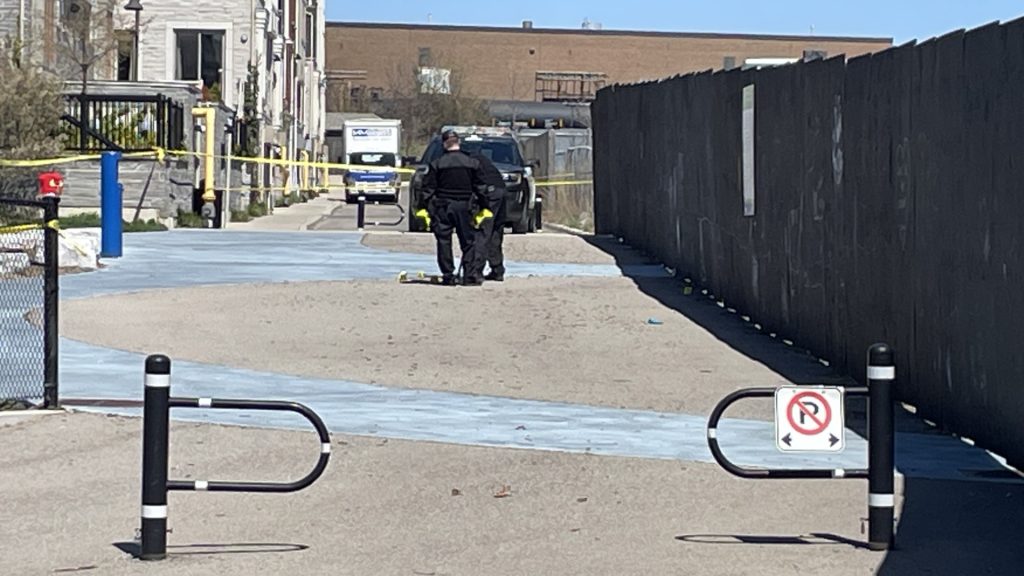Sister describes family’s discovery of Tess Richey’s body at murder trial

Posted January 31, 2020 12:36 pm.
Last Updated January 31, 2020 4:41 pm.
CAUTION: This story contains graphic content related to an alleged sexual assault and might be upsetting to some readers.
A woman whose sister was found dead in a Toronto stairwell two years ago sobbed in court Friday as she recalled her mother’s screams on the phone after making the discovery.
Tess Richey’s mother found her daughter’s body four days after she vanished in November 2017, Rachel Richey testified.
“She was screaming and she told me that she found her and she just kept saying it,” Rachel Richey said through tears at the first-degree murder trial of Kalen Schlatter, who has pleaded not guilty.
“I said ‘Is she alive?’ She said ‘No.'”
It was Nov. 29, the day before Tess Richey would have turned 23 years old. Her mother, Christine Hermeston, and another sister had driven down from North Bay, Ont., several days earlier to look for her.
Upon hearing from her mother, Rachel Richey tore out of her Toronto home clutching her baby, but forgot her shoes, she said. She ran back and grabbed them before getting in a cab.
She arrived at a building under construction in the city’s gay village, where a police officer guarded the scene. She was directed to a waiting ambulance and found her mother inside.
“I got into the ambulance with my mom and there’s not really much to say,” Rachel Richey said.
“The next few minutes, I just cried a lot and hugged my mom.”
The families had been scouring the area since Tess Richey vanished in the early hours of Nov. 25. The young woman had gone out with a friend after spending the day with Rachel.
Rachel Richey had been comforting Tess Richey, who had recently broken up with her boyfriend.
Tess Richey then left to meet up with a friend at Crews and Tangos, a bar in the gay village, Rachel Richey testified.
The prosecution alleges Schlatter met Richey on Nov. 25, 2017, outside a bar in Toronto’s gay village and sexually assaulted then strangled her after she refused his advances.
Rachel Richey said she last heard from her sister at 12:01 a.m. that night in a text saying she had gotten to the bar.
In the prosecution’s opening address to the jury on Thursday, Bev Richards said Schlatter’s DNA was found on Richey’s pants and bra.
She said surveillance video shows Schlatter leading Richey to a stairwell of a building under construction around 4:14 a.m. _ around the same time she was supposed to get into an Uber.
She said the video, which is expected to be presented at trial, will then show Schlatter leaving alone 45 minutes later.
Rachel Richey said she first knew something was wrong when her sister did not respond to her phone calls and texts a day later.
She became more worried when she looked at Uber messages that said Tess Richey missed her ride. She said she sent messages to her sister’s friends, posted pleas for her whereabouts on social media and began searching the neighbourhood for her in the days that followed.
The family plastered the area with missing person posters, she said, including a photograph of Tess Richey taken earlier that day at a park.
“She was my sister, my best friend, she was my soulmate,” Rachel Richey said.
Toronto police were criticized for their handling of the case, along with others in the city’s gay village, and the force has since launched a review of how it handles missing persons investigations. It was supposed to wrap last year but is now expected to finish next January.
Two police officers are facing internal disciplinary charges for their roles in Tess Richey’s missing persons’ investigation, but their cases were put off until the criminal trial is resolved.
CityNews’ Melissa Nakhavoly is tweeting live from the Toronto courtroom:










